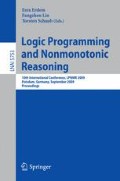Abstract
This paper studies a default logic for social reasoning in multiagent systems. A social default theory is a collection of default theories with which each agent reasons and behaves by taking attitudes of other agents into account. The semantics of a social default theory is given as social extensions which represent the agreement of beliefs of individual agents in a society. We show the use of social default theories for representing social attitudes of agents and for reasoning in cooperative planning and negotiation among multiple agents.
Access this chapter
Tax calculation will be finalised at checkout
Purchases are for personal use only
Preview
Unable to display preview. Download preview PDF.
References
Baral, C., Kraus, S., Minker, J., Subrahmanian, V.S.: Combining default logic databases. J. Cooperative Information Systems 3, 319–348 (1994)
Brewka, G., Roelofsen, F., Serafini, L.: Contextual Default Reasoning. In: Proc. IJCAI 2007, pp. 268–273 (2007)
Buccafurri, F., Caminiti, G.: A social semantics for multi-agent systems. In: Baral, C., Greco, G., Leone, N., Terracina, G. (eds.) LPNMR 2005. LNCS (LNAI), vol. 3662, pp. 317–329. Springer, Heidelberg (2005)
Gelfond, M., Lifschitz, V.: Classical negation in logic programs and disjunctive databases. New Generation Computing 9, 365–385 (1991)
Gelfond, M., Lifschitz, V., Przymusinska, H., Truszczynski, M.: Disjunctive defaults. In: Proc. KR 1991, pp. 230–237 (1991)
Reiter, R.: A logic for default reasoning. Artificial Intelligence 13, 81–132 (1980)
Ryzko, D., Rybinski, H.: Distributed default logic for multi-agent system. In: Proc. Int’l Conf. Intelligent Agent Technology, pp. 204–210 (2006)
Sakama, C.: Inductive negotiation in answer set programming. In: Baldoni, M., Son, T.C., van Riemsdijk, M.B., Winikoff, M. (eds.) DALT 2008. LNCS (LNAI), vol. 5397, pp. 143–160. Springer, Heidelberg (2009)
Author information
Authors and Affiliations
Editor information
Editors and Affiliations
Rights and permissions
Copyright information
© 2009 Springer-Verlag Berlin Heidelberg
About this paper
Cite this paper
Sakama, C. (2009). Social Default Theories. In: Erdem, E., Lin, F., Schaub, T. (eds) Logic Programming and Nonmonotonic Reasoning. LPNMR 2009. Lecture Notes in Computer Science(), vol 5753. Springer, Berlin, Heidelberg. https://doi.org/10.1007/978-3-642-04238-6_44
Download citation
DOI: https://doi.org/10.1007/978-3-642-04238-6_44
Publisher Name: Springer, Berlin, Heidelberg
Print ISBN: 978-3-642-04237-9
Online ISBN: 978-3-642-04238-6
eBook Packages: Computer ScienceComputer Science (R0)

